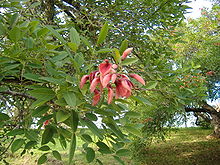El Ceibo
El Ceibo is a producer cooperative for cocoa and cocoa products in Bolivia .
organization
The cooperative "El Ceibo" - named after the jungle tree Ceibo (Erythrina crista-galli) - was founded in 1977 as a cooperative of small cocoa farmers in the Alto Beni in the lowlands of Bolivia. Today the El Ceibo organization comprises 37 basic cooperatives with 1200 active members, who in turn represent more than 6,000 people with their families.
Emergence
In the early 1960s, the Bolivian state launched a resettlement program coordinated and financed by the US development agency USAID , with which families from the Bolivian Altiplano should be encouraged to move to the lowlands. At that time, the highlands suffered from the crisis of tin mining and the low crop yields in agriculture, so that this region suffered from considerable population pressure, which resulted in social tensions.
The Bolivian state gave every family willing to relocate in the lowlands twelve hectares of land, some seeds and tools, as well as technical advice and other aid. The new settlers were recommended to cultivate cocoa, a product for which there was no experience either in Bolivia or among the new settlers. Since the first harvest yields were bought up by middlemen at low prices, the new settlers were forced to achieve cost-covering and living-wage prices through joint production and marketing.
production
90 percent of the cocoa is fermented and dried directly by the farming families belonging to the cooperative , only the remaining ten percent is processed in a central processing plant in Sapecho in the La Paz department . This cooperative plant in the center of the cocoa region was built with start-up financing and technical advice from non-governmental organizations and aid organizations such as DED and Bread for the World , as well as processing plants in El Alto , the neighboring town of La Paz on the Altiplano.
As a niche producer, El Ceibo committed itself to a targeted conversion to organic farming at an early stage and, with the help of fair trade organizations , especially from Europe, was able to set up quality assurance systems, so that today a significant proportion of production complies with IFOAM bio standards.
El Ceibo now produces 70 percent of Bolivia's total cocoa production.
marketing
After the production of El Ceibo flowed almost exclusively into fair trade in Europe and North America in the first decades, smaller proportions of cocoa production are now also exported to Argentina and Chile, the proportion of domestic sales has already reached more than 25 percent. In 1991 EL CEIBO merged with five other Bolivian organizations to form the National Association of Ecological Agricultural Producers ( AOPEB ).

